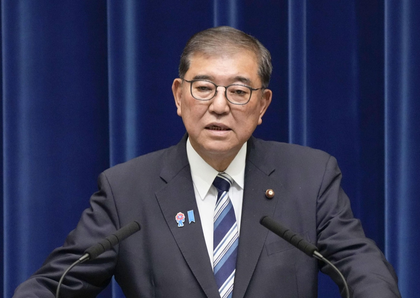South Korea expects to keep positive relations with Japan after Shigeru Ishiba decides to quit
By IANS | Updated: September 8, 2025 12:30 IST2025-09-08T12:27:35+5:302025-09-08T12:30:15+5:30
Seoul, Sep 8 The South Korean presidential office said Monday it expects to maintain positive relations with Tokyo, ...

South Korea expects to keep positive relations with Japan after Shigeru Ishiba decides to quit
Seoul, Sep 8 The South Korean presidential office said Monday it expects to maintain positive relations with Tokyo, after Japanese Prime Minister Shigeru Ishiba decided to resign over an election setback.
South Korea and Japan "have reached a broad consensus on building future-oriented and stable relations," a senior official at the presidential office said.
"We expect the two nations to continue positive relations going forward despite Ishiba's resignation."
The presidential office has been closely monitoring developments related to Ishiba's decision to quit, but refrained from commenting on Japan's domestic politics, according to the official.
South Korean President Lee Jae Myung visited Tokyo in late August for his second talks with Ishiba, where the two leaders agreed to strengthen cooperation.
But tensions remain as Seoul recently decided to boycott Japan's upcoming ceremony marking the Sado mine linked to the wartime forced labor of Koreans, citing Tokyo's lack of sincerity in honoring the victims, Yonhap news agency reported.
Earlier on Sunday, Shigeru Ishiba had announced his decision to step down, bowing to mounting pressure within the Liberal Democratic Party (LDP) to take responsibility for back-to-back electoral setbacks, thus bringing an end to his 11-month tenure, according to local media reports.
"I have decided to resign from my position as president of the Liberal Democratic Party," 68-year-old Ishiba had declared during a televised press conference.
"I have told Secretary-General Moriyama to carry out the procedures for a presidential election... I would like him to begin the process of selecting a new president," he had added.
Ishiba assumed office last October and has been resisting the calls to resign for weeks now.
He had warned that his departure could leave Japan facing a political vacuum at a time when the nation grapples with "big challenges" -- including US tariffs, rising prices, rice policy reforms and growing regional tensions.
His resignation was announced one day before the Liberal Democratic Party (LDP) was scheduled to decide on holding an early presidential election.
This decision follows a significant defeat in the recent Upper House elections, which resulted in the LDP-Komeito coalition losing its majority, according to the nation's leading daily, The Japan Times.
Until recently, Ishiba had been determined to remain in office and tackle pressing issues, particularly in the economic sphere.
As late as Friday, he had reaffirmed his commitment to lead the government in implementing an economic stimulus package in the coming months.
Calls for his resignation, however, had increased within the party, with senior members urging him to resign before the leadership vote to avoid worsening divisions.
Disclaimer: This post has been auto-published from an agency feed without any modifications to the text and has not been reviewed by an editor
Open in app